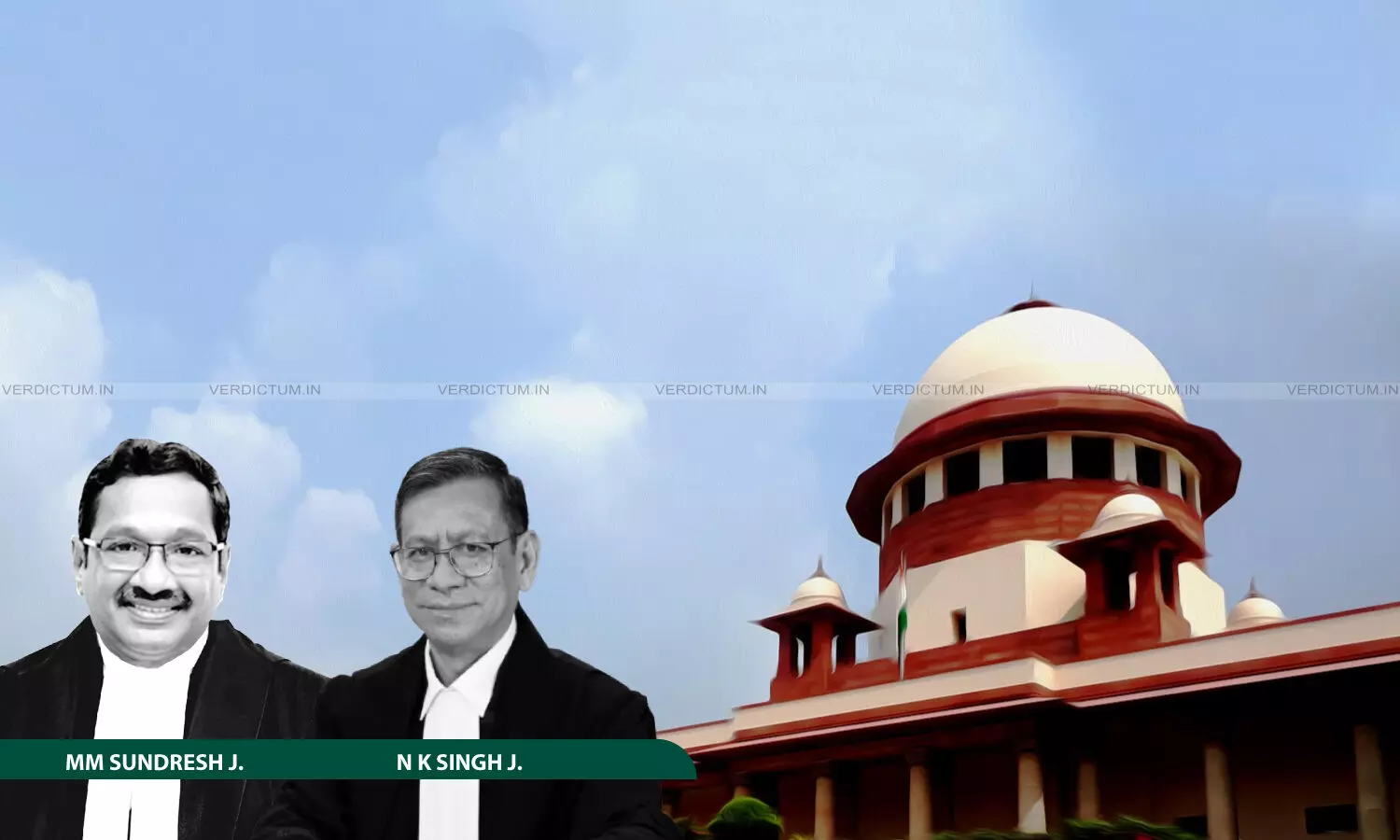
Justice M.M. Sundresh, Justice N. Kotishwar Singh , Supreme Court of India
Electronic Communication Not Valid Mode Of Service Of Notice U/S. 35 Of BNSS: Supreme Court Upholds Order Barring WhatsApp Notice
 |
|The Application before the Supreme Court was filed seeking modification of the order whereby it was held that service of the notices under Section 41-A of the CrPC, through WhatsApp or other modes of electronic communication, cannot be considered as an alternative to the mode of service prescribed under the CrPC, 1973/BNSS, 2023.
The Supreme Court has dismissed an application seeking modification of its earlier order barring service of notices under Section 41A of the Code of Criminal Procedure (CrPC) or Section 35 of the Bharatiya Nagarik Suraksha Sanhita (BNSS), 2023, through WhatsApp or other electronic modes. The Apex Court made it clear that electronic communication is not a valid mode of service of notice under Section 35 of the BNSS.
The Application before the Supreme Court was filed by the State of Haryana seeking modification of the order passed in Satendar Kumar Antil v. CBI & Anr. (2025) whereby it was held that service of the notices under Section 41-A of the Code of Criminal Procedure, 1973, through WhatsApp or other modes of electronic communication, cannot be considered or recognised as an alternative or substitute to the mode of service recognised and prescribed under the CrPC, 1973/BNSS, 2023.
The Division Bench of Justice M. M. Sundresh and Justice Nongmeikapam Kotiswar Singh held, “Hence, when viewed from any lens, we are unable to convince ourselves that electronic communication is a valid mode of service of notice under Section 35 of the BNSS, 2023, since its conscious omission is a clear manifestation of the legislative intent. Introducing a procedure into Section 35 of the BNSS, 2023, that has not been specifically provided for by the Legislature, would be violative of its intent.”
Factual Background
The Apex Court had directed all the States and Union Territories to issue a Standing Order to their respective police machinery to issue notices under Section 41-A of the Code of Criminal Procedure, 1973 1 (CrPC, 1973)/Section 35 of the Bharatiya Nagarik Suraksha Sanhita (BNSS, 2023) only through the mode of service as prescribed under the CrPC, 1973/BNSS, 2023. It was also held that the Standing Orders must be issued strictly in accordance with the guidelines issued by the Delhi High Court in Rakesh Kumar v. Vijayanta Arya (DCP) & Ors. (2021) and Amandeep Singh Johar v. State (NCT Delhi) (2018), both of which were upheld by this Court in Satender Kumar Antil v. CBI & Anr. (2022).
Arguments
One of the arguments raised by the applicant was that Section 64(2) of the BNSS, 2023, relates to system-generated summons, i.e., the e-Summons App, hence the requirement of the Court's seal to make them look authentic, whereas, Section 71, relates to physical summons duly signed, scanned and transmitted electronically, because of which there is no separate requirement of any watermark seal. A notice under Section 35 of the BNSS falls within the same category as a summons under Section 71 and therefore must be permitted to be transmitted electronically.
Reasoning
On a perusal of the provisions of the BNSS, 2023, the Bench noted that the service of a notice under Section 35 needs to be carried out in a manner that protects this substantive right, as non-compliance with the notice can have a drastic effect on the liberty of an individual. “On a plain reading of the BNSS, 2023, the restrictions imposed by the Legislature on the use of electronic communication, to only certain procedures, precludes the use of electronic communication for any other procedure, for which it has not been specifically permitted by the BNSS, 2023”, it said.
Referring to Sections 63 and 64, the Bench clarified that the argument on behalf of the applicant that Section 64(2) of the BNSS, 2023 relates to system-generated summons, hence the requirement of the Court's seal to make them look authentic, fell to the ground because, irrespective of the summons being issued under Section 63(i) or Section 63(ii) of the BNSS, 2023, it shall necessarily bear the seal of the Court, or the image of the seal of the Court, when the summons is being served.
The Bench also refused to accept the contention that a notice under Section 35 of the BNSS, 2023, falls within the same category as a summons under Section 71 and therefore, since the latter allows electronic mode of service, the former must also be permitted to be transmitted electronically. It was observed that a summons under Section 71 of the BNSS, 2023, has no immediate bearing on the liberty of an individual in case of its non-compliance. However, a notice under Section 35 of the BNSS, 2023 could have an immediate bearing on the liberty 18 of the individual in case of its non-compliance, as laid down under Section 35(6) of the BNSS, 2023.
The Court explained that the usage of electronic communication by the Investigating Agency, has only been provided for effecting the procedure under Sections 94 and 193 of the BNSS, 2023. Section 94 deals with the issuance of summons, in an electronic form, to produce a document. Section 193 deals with the usage of electronic communication for forwarding the report to a Magistrate, upon completion of the investigation, or to inform the progress of the investigation to the informant or victim. None of these procedures has any bearing on the liberty of an individual, it noted.
Thus, holding that electronic communication is not a valid mode of service of notice under Section 35, the Bench dismissed the application.
Cause Title: Satender Kumar Antil v. Central Bureau of Investigation And Anr. (Neutral Citation: 2025 INSC 909)